The Economic Aspect of the Abolition of the West Indian Slave Trade and Slavery
WORLD SOCIAL CHANGE
Series Editor: Mark Selden
Perilous Passage: Mankind and the Global Ascendance of Capital
Amiya Kumar Bagchi
Anarchy as Order: The History and Future of Civil Humanity
Mohammed Bamyeh
Water Frontier: Commerce and the Chinese in the Lower Mekong Region, 17501880
Edited by Nola Cooke and Li Tana
Empire to Nation: Historical Perspectives on the Making of the Modern World
Edited by Joseph W. Esherick, Hasan Kayali, and Eric Van Young
First Globalization: The Eurasian Exchange, 15001800
Geoffrey C. Gunn
Istanbul: Between the Global and the Local
Edited by Caglar Keyder
China: Its Environment and History
Robert B. Marks
The Origins of the Modern World: A Global and Ecological Narrative
Robert B. Marks
The Politics of Greed: How Privatization Structured Politics in Central and Eastern Europe
Andrew Schwartz
Leaving China: Media, Mobility, and Transnational Imagination
Wanning Sun
Masters of Terror: Indonesias Military and Violence in East Timor
Edited by Richard Tanter, Gerry van Klinken, and Desmond Ball
Through the Prism of Slavery: Labor, Capital, and World Economy
Dale W. Tomich
Politics and the Past: On Repairing Historical Injustices
Edited by John Torpey
The Economic Aspect of the Abolition of the West Indian Slave Trade and Slavery
Eric Williams, edited by Dale W. Tomich, introduction by William Darity Jr.
The Economic Aspect of the Abolition of the West Indian Slave Trade and Slavery
Eric Williams
Edited by Dale Tomich
With an Introduction by William Darity Jr.

A FERNAND BRAUDEL CENTER BOOK
Rowman & Littlefield
Lanham Boulder New York Toronto Plymouth, UK
Published by Rowman & Littlefield
4501 Forbes Boulevard, Suite 200, Lanham, Maryland 20706
www.rowman.com
10 Thornbury Road, Plymouth PL6 7PP, United Kingdom
Copyright 2014 by Rowman & Littlefield
All rights reserved. No part of this book may be reproduced in any form or by any electronic or mechanical means, including information storage and retrieval systems, without written permission from the publisher, except by a reviewer who may quote passages in a review.
British Library Cataloguing in Publication Information Available
Library of Congress Cataloging-in-Publication Data
Williams, Eric Eustace, 1911-1981.
The economic aspect of the abolition of the West Indian slave trade and slavery / Eric Williams ; edited by Dale W. Tomich ; introduction by William Darity Jr.
pages cm. (World social change)
Includes bibliographical references and index.
ISBN 978-1-4422-3139-9 (cloth : alk. paper) ISBN 978-1-4422-3140-5 (electronic) 1. Industries--Great BritainHistory. 2. Great BritainEconomic conditions. 3. Slave tradeGreat Britain. I. Tomich, Dale W., 1946- editor. II. Title.
HC254.5.W5 2014
382'.4409729dc23
2013048228
 The paper used in this publication meets the minimum requirements of American National Standard for Information SciencesPermanence of Paper for Printed Library Materials, ANSI/NISO Z39.48-1992.
The paper used in this publication meets the minimum requirements of American National Standard for Information SciencesPermanence of Paper for Printed Library Materials, ANSI/NISO Z39.48-1992.
Printed in the United States of America

Contents

Preface
Dale Tomich
Distinguished West Indian historian and politician Eric Williams is perhaps best known for his Capitalism and Slavery , first published in 1944. The books enduring importance lies in its comprehensive, systematic, and forceful effort to integrate the history of slavery and the history of capitalism into a unified analytical account. Williams boldly argued for the importance of slavery for the development of capitalism in Britain and for the role of industrial capitalism in creating the conditions for the abolition of the slave trade and slave emancipation. From within this framework, he counterposed economic motives and economic development to the prevailing humanitarian interpretation of British abolition. Capitalism and Slavery thus provides a critical account of colonialism, mercantilism, and capitalism articulated from a Caribbean perspective. Capitalism and Slavery remains a fundamental work of Caribbean and Atlantic history and is widely cited nearly seventy years after its publication. Beyond the study of history it has influenced international scholarship on questions of dependency, development, and the world-economy in a variety of disciplines. It is still a critical reference and continues to be the subject of scholarly controversy today.
In recent years, the controversy around Capitalism and Slavery has crystallized around what has come to be known as the Williams debate. This debate has proven to be fertile ground for the new economic history. New economic historians have engaged in a broad examination of the economy of the slave trade and slavery and have interrogated the Williams thesis utilizing neoclassical economic theory, new techniques of analysis, and new sources of data made possible by the development of computer technology. They have produced impressive results, and their work has reshaped the study of slavery and economic history more generally. The consensus among the economic historians appears to be that Williams is incorrect. Slavery and the slave trade were profitable, and there was no economic impetus behind the abolition of the slave trade. Ironically, by invalidating the economic argument, they have resurrected the humanitarian argument and emphasize ideology and moral force as the factors behind the abolition of slavery. These results have engendered new controversy over the methods and techniques of the new economic history as well as the results that it has produced. The rejection of Williamss argument and analysis is contested, even from within the ranks of the economic historians and certainly from without.
It is against this background that the publication of The Economic Aspect of the Abolition of the West Indian Slave Trade and Slavery assumes renewed importance. The dissertation was defended at Oxford University in 1938. William Darity in his introduction as well as other Williams scholars have indicated the obstacles that Williams faced both in defending the dissertation and in getting it published. Capitalism and Slavery only came into print six years after the defense of the dissertation. For Williams, these were important years of intellectual and political development, influenced particularly by his experiences on the faculty at Howard University, further study of the entire Caribbean region, and by his voyage to Cuba, Haiti, the Dominican Republic, and Puerto Rico in 1940. When it finally appeared, Capitalism and Slavery was very different from the dissertation. This, of course, is not at all unusual, but in this instance, the dissertation arguably gains rather than loses significance in relation to the published work.
The Economic Aspect of the Abolition of the West Indian Slave Trade and Slavery brings three thingsotherwise unavailableto the contemporary reader. Firstly, its content is different from that of Capitalism and Slavery . It contains an extended analysis of slave emancipation and other questions that are not included in the later work. At the same time, none of the material concerning the role of slavery in the emergence of capitalism appears in the dissertation. Secondly, Williamss arguments are developed in greater detail and are more fully documented. The dissertation contains a wealth of information, insights, and hypotheses that will at once allow us to reinterpret Capitalism and Slavery and enrich current scholarship. Finally and perhaps most importantly, the dissertation gives us access to the workshop of a master historian as he comes to grips with the relation between slave abolition and emancipation, capitalist development, and imperial politics. Using the tools of his day, he asks questions and opens perspectives that are still pertinent and provocative. Indeed, his conceptual and theoretical preoccupations have become more pertinent with the passage of time.
Next page
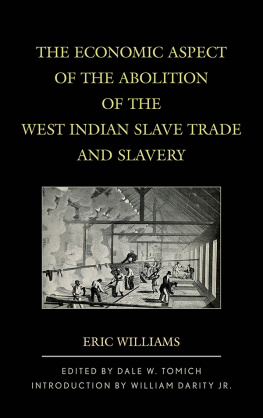

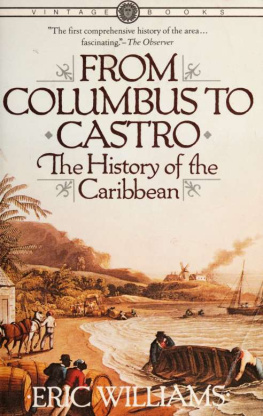

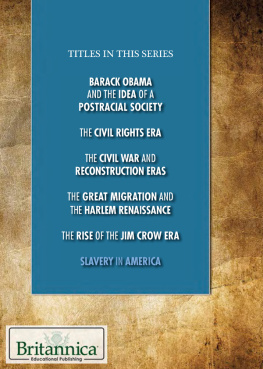


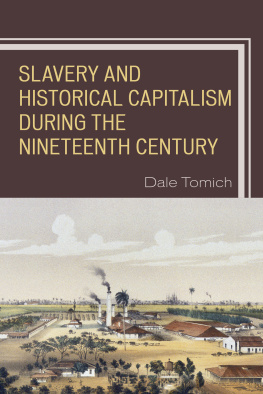
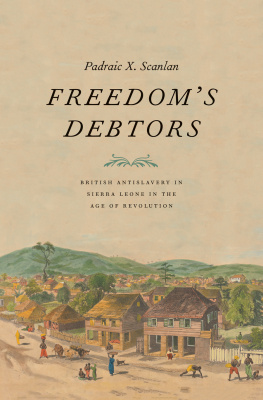

 The paper used in this publication meets the minimum requirements of American National Standard for Information SciencesPermanence of Paper for Printed Library Materials, ANSI/NISO Z39.48-1992.
The paper used in this publication meets the minimum requirements of American National Standard for Information SciencesPermanence of Paper for Printed Library Materials, ANSI/NISO Z39.48-1992.
